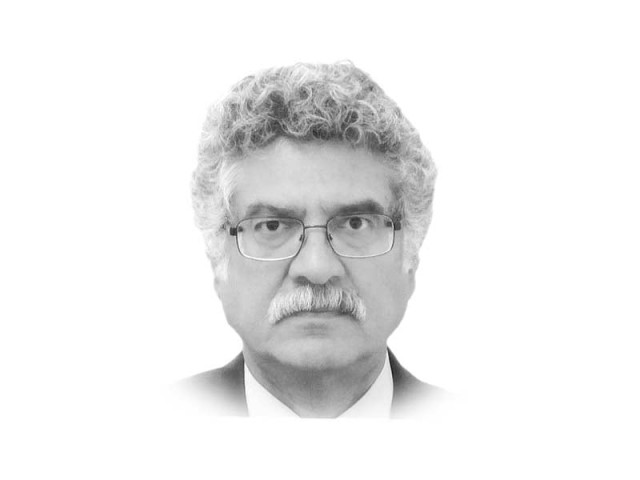Regime change?
Political turmoil that has been unleashed due to American interference could generate internal chaos

Addressing a public rally on 27th March, Prime Minister Imran Khan charged on the basis of documentary evidence that foreign powers are trying to bring about regime change in Pakistan through supporting the opposition’s no-confidence motion against him. While the opposition has denied these charges, such a serious assertion from the head of government deserves serious scrutiny.
The document in question, a report of 7th March from the Ambassador in Washington – the contents of which were shared with journalists before it was placed before the National Security Committee – reportedly maintains that it is no longer possible for Washington to work with the incumbent Prime Minister and if the no-confidence vote fails then there would be dire consequences for Pakistan. Bur if the motion succeeds, bilateral relations would significantly improve. Intriguingly, these remarks predate the tabling of the no-confidence motion which suggests that this move has American endorsement. Even more alarming is the contention of some government spokesmen that the message contains threats which endanger the life of the Prime Minister.
Western powers have been openly critical of Pakistan’s decision not to join the US-led alliance against Russia for its invasion of Ukraine and of the Prime Minister’s visit to Moscow before the invasion, taking the diplomatically unprecedented and unacceptable step to castigate Pakistan in a joint press statement. More broadly as well, Americans have been critical of Pakistan’s foreign policy direction, specifically relations with China, Russia and Afghanistan while being incensed about the refusal to provide military bases. Therefore, it would not be surprising if regime change in Pakistan is being sought by Washington.
It is worth recalling that Prime Minister ZA Bhutto had claimed an American conspiracy to remove him from power after the 1977 elections owing to his refusal to abandon Pakistan’s nuclear weapons programme for which the US had threatened to “make an example” of him. Later General Zia died in a mysterious plane crash for which many Pakistanis blame the US, on the grounds that Zia had become a liability for Washington after the Soviet withdrawal from Afghanistan in 1989. The ouster of General Musharraf in 2008 was accomplished more openly by the Bush administration with his own naïve collaboration, once the Americans realised that he could no longer mobilise public support for the American “War on Terror”. With the passage of time such charges of American interference are now broadly accepted in Pakistan.
This conviction is strengthened by the more recent publicly acknowledged US policy of regime change such as in Iraq, Libya and Syria. Only a few days ago, President Biden himself called for removing Russian President Putin, though subsequently his officials retracted this statement. There are also several other prominent examples of American regime change documented in numerous books and articles. In 1953, Iranian Prime Minister Mosaddagh was removed in a coup orchestrated by the US and the UK to take control over Iranian oil. In 1961, Prime Minister Patrice Lumumba of Congo was removed and executed with the involvement of the American CIA, for his relations with the Soviet Union. Similarly, the CIA was involved in the overthrow and death of Salvador Allende, President of Chile in 1973, owing to his socialist policies. Several failed attempts were also made by American administrations to remove Cuban President Fidel Castro including an abortive military invasion of the Island. Similarly, the Reagan administration created the “Contras” to overthrow Nicaraguan Leader, Daniel Ortega. These are among the more well-known instances of regime change by the US which include dozens of others in Latin America and South-East Asia, such as in Guatemala (1953-1990s); Costa Rica (1950-1970); Vietnam (1945-1973); Cambodia (1955-1973); Ecuador (1960-1963) among others listed meticulously by William Blum in his book Rogue State.
With such a track record, it is indeed conceivable that the US would be willing to orchestrate the removal of Imran Khan’s government and promote a more pliable set-up instead. The brief positive trend in Pakistan-US relations, following Pakistan’s facilitation of the American-Taliban dialogue, ended when the Biden administration took over. The American debacle in Afghanistan for which Pakistan has been blamed, compounded further by the refusal to provide bases, has led to vengeful indignation. Such pique has been aggravated by Pakistan’s outreach to China and Russia, especially implementation of CPEC and promotion of regional connectivity which undermines America’s containment of China in the Asia-Pacific. Moreover, India’s continuing tensions with Pakistan over Kashmir and with China in Laddakh, confronting that country with a two-front challenge, undermine India’s role as “net security provider” for the Americans. Therefore, the US wants Pakistan to “normalise” relations with India but on Indian terms which is rejected by Khan’s government. These are the geopolitical considerations that essentially underscore the American compulsion for regime change in Pakistan.
But, even in the event of the opposition succeeding in the no-trust vote against the PM, it is unlikely that American objectives would be realised. No Pakistani government, no matter how pliable, would be able to reverse the popular consensus on key national issues such as Kashmir, the nuclear programme, relations with China and pursuit of a balanced foreign policy. Past experience amply demonstrates this. Bhutto’s ouster did not reverse the nuclear programme. Zia’s removal did not change Afghan policy nor did Musharraf’s abdication. But, due to their arrogance, the Americans are purblind to the reality that any change of leadership in Pakistan cannot deviate from the country’s strategic interests. But the political turmoil that has been unleashed due to American interference could generate internal chaos undermining Pakistan’s political and economic development. It is, therefore, essential for all political parties to recognise and overcome the dangers ahead.















COMMENTS
Comments are moderated and generally will be posted if they are on-topic and not abusive.
For more information, please see our Comments FAQ